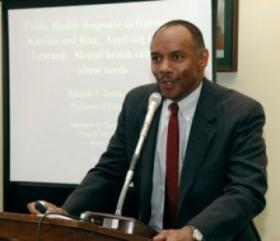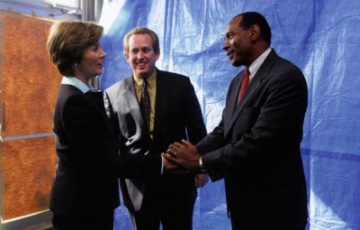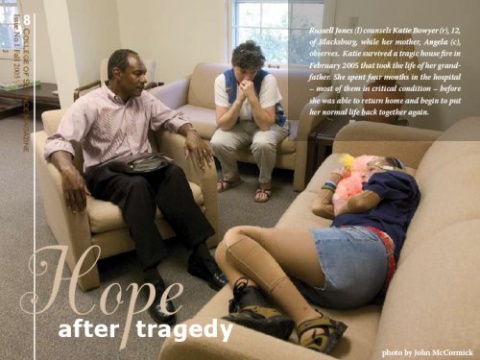About Us
 Please see our Research Lab Website (above) for information about our recent projects and current graduate students. Dr. Jones and his team have studied the influence of major technological and natural disasters on children for the past 30 years. He and his team have been the recipients of several major research grants from prominent agencies including NIMH and FEMA. The success of their work has been acknowledged by the Bush administration and Congress through inviting Dr. Jones to provide mental health expertise in briefings with the First Lady and Congressional staff. Dr. Jones continues to be actively engaged in research; most recently he was appointed to a Harvard Medical School advisory group studying the mental health impact on survivors of Hurricane Katrina.
Please see our Research Lab Website (above) for information about our recent projects and current graduate students. Dr. Jones and his team have studied the influence of major technological and natural disasters on children for the past 30 years. He and his team have been the recipients of several major research grants from prominent agencies including NIMH and FEMA. The success of their work has been acknowledged by the Bush administration and Congress through inviting Dr. Jones to provide mental health expertise in briefings with the First Lady and Congressional staff. Dr. Jones continues to be actively engaged in research; most recently he was appointed to a Harvard Medical School advisory group studying the mental health impact on survivors of Hurricane Katrina.
Congressional Briefing
Dr. Jones is interested in studying the impact of traumatic events on children and their parents. Most recently, on January 19, 2006, Dr. Jones served as one of three speakers at an American Psychological Association sponsored educational congressional briefing entitled "The Public Health Response to Hurricanes Katrina and Rita -- Applying Lessons Learned". His presentation focused on the range of mental health and substance abuse needs identified during his onsite visits to Louisiana and Mississippi in the weeks following Katrina. Highlighting problems in pediatric populations, Dr. Jones discussed the activities of the National Child Traumatic Stress Network and the need to take corrective actions to restore the eroded infrastructure for administering mental health services.

Russell T. Jones (right), professor of psychology in the College of Science, greets First Lady Laura Bush and Pastor R. Dennis Watson in Baton Rouge, La. recently. Jones, an expert on the psychological effects of trauma and natural disasters on children, and a member of the Terrorism and Disaster Branch of the National Child Traumatic Stress Network, was called upon by the White House to help prepare the first lady prior to her visit with children displaced by Hurricane Katrina. Jones has made numerous trips to the Gulf Coast to assist in disaster relief efforts since Katrina struck last August. He led the first crisis counseling team of its kind to the hardest hit regions of Mississippi.
Current Research Projects
Virginia Tech 4/16 Shooting
We collected survey data pertaining to traumatic stress as well as a range of psychological and issues in a sample of Virginia Tech students. These data has catalyzed a range of projects spanning symptom-specific analyses, public health issues such as access to care, protective and risk factors, etc. We also collected parallel survey data pertaining to traumatic stress as well as a range of psychological and issues in a sample of Virginia Tech faculty. The process of analyzing this data is still in its beginning stages, and promises to offer the potential for a range of projects spanning symptom-specific analyses, public health issues such as access to care, protective and risk factors, etc.
Psychophysiology of Stress and Trauma
We are currently engaged in a collaboration with Dr. Bruce Friedman's Mind-Body Lab. The project includes a survey component recruiting an expected sample of roughly 200 VT undergraduates filling out a comprehensive battery of survey questions pertaining to a wide range of psychological disorders, physical health disorders, behavioral health characteristics, substance use, and social characteristics. Additionally, a subset of survey respondents will be brought in for a lab study measuring HRV and startle in a fear-learning paradigm over three time points during a three week span. Planned analyses include: 1) An RDoC-inspired transdiagnostic examination of fear learning, safety signal learning, and retention across DSM fear-related disorders and 2) An RDoC-inspired examination of fear versus anxiety.
The Impact of Historical and Systematic Trauma on People of Color
PTSD Symptom-level analysis
Past Projects
Hurricane Katrina Recovery Effort
After Hurricanes Katrina and Rita ravaged the states of Louisiana and Mississippi, Dr. Jones was deployed to the area for the SAMHSA mental health consultant group. Reaching the area less than three weeks after the disaster, Dr. Jones traveled to both Louisiana and later to Gulfport, Mississippi where he served as a team leader. Since then Dr. Jones has traveled to the area on five occasions. His work in the area has included visits to schools and disaster recovery centers and state offices. Most notably, Dr. Jones met with First Lady Laura Bush at Celebration Church outside Baton Rouge, where they and other officials participated in a briefing discussing conditions and needs of children affected by Katrina.
Harvard Medical School Study
Dr. Jones was also been appointed to the Hurricane Katrina Community Advisory Group administered by the Department of Health Care Policy at the Harvard Medical School. This group conducted a random national survey of 250,000 homes (funded by the National Institute on Mental Health) to ascertain the mental health consequences of the hurricanes. The researchers will identify a cohort of approximately 2000 individuals directly affected and displaced by the hurricanes and follow them for 2 years to assess their level of coping with physical and mental health issues, as well as the logistical difficulties associated with relocating or returning to some sense of a normal routine.

REAACT Project
Dr. Jones spearheaded a project in conjunction with the Yale Child Study Center at Yale University designed to treat children following residential fire. The project, entitled Recovery Effort after Adult and Child Trauma (REAACT), adapted the Yale Child Study Center's Child Development Community Policing Program (CD-CP) model, to involve firefighters. Through this project, firefighters learned about the negative effects of fire on children. At the scene of a fire, firefighters are encouraged to contact REAACT clinicians who will make initial contact with the family. This partnership enables our clinicians to connect with families immediately following the traumatic incident.
NIMH Grant
He and his team have studied the influence of major technological and natural disasters on children's functioning for the past 30 years. His research team completed a National Institute of Mental Health (NIMH) grant assessing the impact of residential fire on children and their parents. Two recent grants from Federal Emergency Management Agency (FEMA) enabled his group to study both injured and non-injured children following fire-related trauma. The ascertainment of mediators and moderators of distress, including coping and social support, is also an important target area.
Select Publications and Presentations
- REAACT: ABC's of Fire
- REAACT: Pamphlet
- REAACT: Coloring Book
- REAACT: Brochure 1
- REAACT: Brochure 2
- REAACT: Brochure 3
- REAACT: Brochure 4
- REAACT: Brochure 5
- 2011- Posttraumatic Stress Among Students After the Shootings at Virginia Tech
- 2009-Fear in Children and Adolescents: The Roles of Negative Life Events,Attributional Style, and Avoidant Coping
- 2004- Residential Fires
- 2006-Characterizing Time in Longitudinal Trauma Research
- 2005 - The Role of Self-Worth, Social Support, and Family Religious Environment in Children and Adolescents Religious Coping following Residential Fires
- 2005-Post-Traumatic Symptomatology in Adolescents following Wildfire: The Role of Coping Strategy and Efficacy
- 2004 - Children's Religious Coping Following Residential Fires - An Exploratory Study
- 2002- Psychological impact of fire disaster on children and their parents
- 2002 - Psychological Impact of Fire Disaster on Children and their Parents.pdf
- 1991 - Child, Adolescent, and Adult Victims of Residential Fire - Psychosocial Consequences
- Post-Traumatic Symptomatology in Adolescents following Wildfire The Role of Coping Strategy and Efficacy
- 1988 - An Extension and Refinement of Telephone Emergency-Skills Training - A Comparison of Training Methods.pdf
- 1984 - Emergency Fire Safety Skills For Blind Children and Adolescents - Group Training and Generalization
- 1984 - Emergency Fire Safety Skills - A Study with Blind Adolescents
- 1981 - Social Validation and Training of Emergency Fire Safety Skills for Potential Injury Prevention and Life Saving
- 2009-Impact of Hurricanes on Children
- 2009-Serious Emotional Disturbance Among Youths Exposed to Hurricane Katrina 2 Years Postdisaster
- 2008- Hurricane Katrina: Experiences of Psychologists and Implications for Future Disaster Response
- 2006-Mental illness and suicidality after hurricane Katrina
- 2007-Exposure to hurricane-related stressors and mental illness after hurricane Katrina (PDF)2007- Exposure to Hurricane-Related Stressors and Mental Illness After Hurricane Katrina
- 2001 - The Psychological Effects of Hurricane Andrew on Ethnic Minority and Caucasian Children and Adolescents - A Case Study
- Jones-Kessler-Hurricanes Katrina and Rita Study
- CRTES-Uganda
- Jones Journal Summer 07
- Jones Journal Fall 06
- Conducting Research in Diverse, Minority, and Marginalized Communities
- Jones Journal - Fall 2005
- 2001 - Fear in Children and Adolescents - Relations with Negative Life Events, Attributional Style, and Avoidant Coping
- 2008-Who's Looking Out for the Kids?
- 2010-Integration of Mental and Behavioral Health in Federal Disaster Preparedness, Response, and Recovery: Assessment and Recommendations
Links and Resources
The CRTES Assesment was created in 2002 by Dr. Russel T. Jones at Virginia Tech. The CRTES is a 23-item self-report measure designed to assess psychological responses to stressful life events. The measure is based on the Horowitz Impact of Events Scale and was initially modified to assess Intrusion and Avoidance symptoms based on DSM-III-R criteria. The scale was recently modified to include assessment of Arousal and to update the items with regard to DSM-IV criteria.
Click here to view a Longitudinal Assesment of Fire Survivors Using the CRTES.